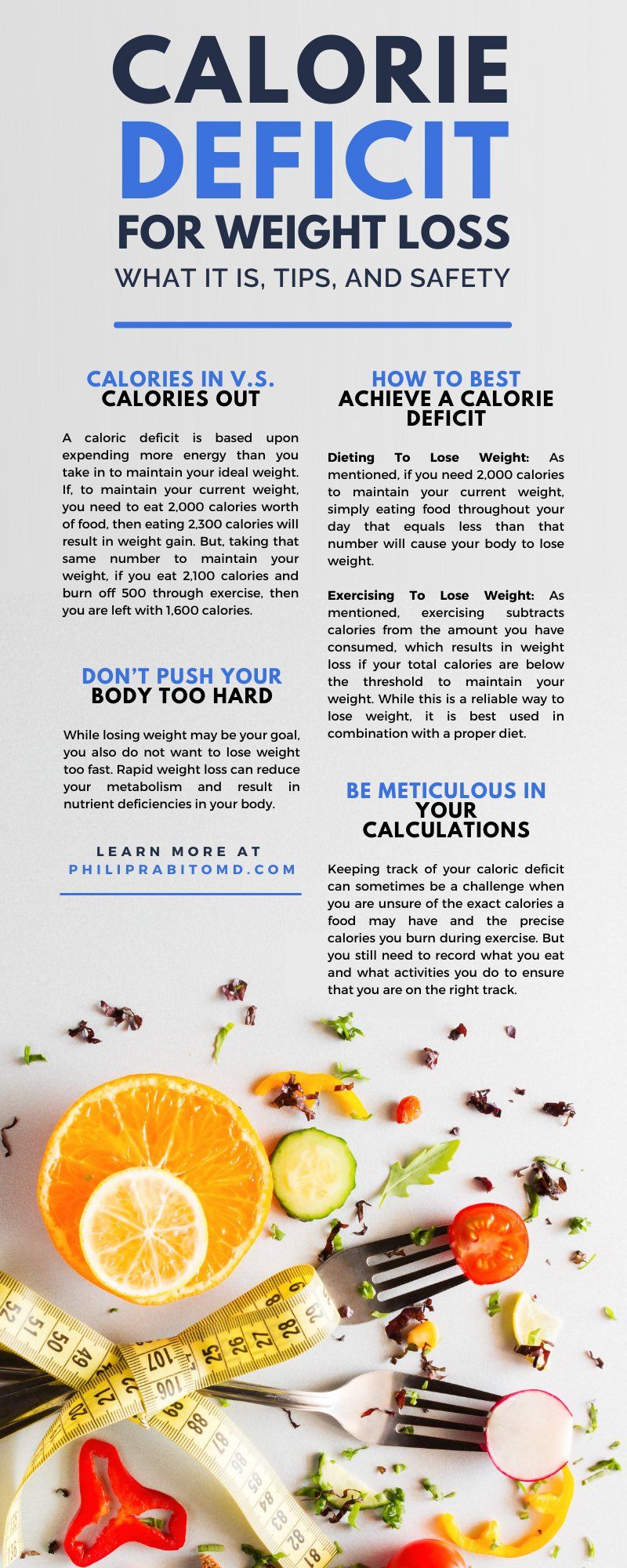Knowing what calorie deficit for weight loss is, some tips, and how to do it safely will allow you to diet and exercise in a more efficient and healthy manner.

When you begin your weight loss journey, the most valuable information you can have is how calorie deficit affects weight loss. Knowing this, along with how many calories you take in during the day and how many you burn, allows you to more efficiently calculate and plan your weight loss, giving you far greater control over your body.
But it is not enough to know what a calorie deficit is; you must also know how to go about losing weight by burning calories safely. There are ways in which you can cause unintentional harm to your body, and knowing the correct methods of calorie deficit for weight loss can aid in you avoiding these unnecessary dangers.
The Basics of Calorie Deficit
We consume calories through food and drink which fuels our bodies and gives us energy throughout the day. Excess calories that we do not burn off are stored for later use as fat; this had an evolutionary benefit of providing us energy in times when food was scarce.
But in our modern society, we are typically in no short supply of food. This process of storing calories now more commonly works against us rather than benefiting us as we consume more energy than we burn.
How Our Bodies Typically Burn Calories
There are a few ways that we burn calories throughout the day; some of these processes are automatic, while others require physical activity on our part.
Resting Energy Expenditure
The body naturally burns calories to keep itself functioning. Every time your heart beats or your lungs breathe, your body is using calories to make that happen. You burn calories just from your body existing, whether awake and active or at rest and asleep.
Thermic Effect of Food
Your body also uses up calories to digest the food you eat and to metabolize that food.
Active Energy Expenditure
This is what we typically think of when we picture burning off calories, playing sports, or taking part in other such physical activities. Whether you are walking, running, doing pushups, or playing soccer, your body must exert itself and spend more calories to fuel your body in order to continue moving.
Calories in V.S. Calories Out
A caloric deficit is based upon expending more energy than you take in to maintain your ideal weight. If, to maintain your current weight, you need to eat 2,000 calories worth of food, then eating 2,300 calories will result in weight gain. But, taking that same number to maintain your weight, if you eat 2,100 calories and burn off 500 through exercise, then you are left with 1,600 calories. You are at a deficit of 200 calories, resulting in eventual weight loss if that pattern keeps up over time.
How To Best Achieve a Calorie Deficit
There are two main ways that you can achieve a calorie deficit: diet and exercise. It does not require both, but the effects can be enhanced if you use a combination of the two in tandem.
Dieting To Lose Weight
To put it simply, there are calories in everything we eat, from potato chips to steak. There are other nutritional values to think of, such as sugar content, protein, and fats, but let’s keep it simple by only focusing on calories for now. As mentioned, if you need 2,000 calories to maintain your current weight, simply eating food throughout your day that equals less than that number will cause your body to lose weight.
Health Concerns With Dieting
It may be tempting to starve your body of calories to lose weight quickly, but that will cause harm to yourself. Depriving your body of sufficient energy will result in your body shutting down. While decreasing the number of calories you intake will result in weight loss, decreasing your calories too much will deny your body the energy it needs to survive.
Keep Nutrition in Mind
You also need to consider the nutritional value of the food you are eating. Eating food based solely on the amount of calories it has can result in you depriving your body of the other necessary nutrients it needs to keep healthy. You need to ensure that you include monosaturated fats, protein, fiber, and vitamins. Lacking these nutrients will negatively affect the process of your body, so make sure your dietary choices consider the nutritional value as well as the calories.
Exercising To Lose Weight
As mentioned, exercising subtracts calories from the amount you have consumed, which results in weight loss if your total calories are below the threshold to maintain your weight. While this is a reliable way to lose weight, it is best used in combination with a proper diet.
Don’t Neglect Eating Before Exercising
While you may be hesitant to skip a meal before an exercising session, it is vital that you do not go into your workout on a completely empty stomach. You need to prepare your body for the strenuous activity that you will be subjecting it to, and adequately filling yourself with calories, protein, and fiber will make sure that your body can properly process the activities.
Don’t Push Your Body Too Hard
While losing weight may be your goal, you also do not want to lose weight too fast. Rapid weight loss can reduce your metabolism and result in nutrient deficiencies in your body. It is recommended to take your weight loss journey at a slower pace to ensure your body has time to adjust to the changes.
Be Meticulous in Your Calculations
Keeping track of your caloric deficit can sometimes be a challenge when you are unsure of the exact calories a food may have and the precise calories you burn during exercise. But you still need to record what you eat and what activities you do to ensure that you are on the right track.
Know How Your Body Works
Every body works a little differently, especially when dealing with weight loss and all the bodily chemicals associated with it. There are times when losing weight seems impossible, even when you are doing everything right. In these circumstances, you may need to consult a specialist to identify what is going on with your body that is preventing you from reaching your weight goals.
Dr. Philip Rabito is one such specialist and is among the top-rated endocrinologists in New York City. With an extensive history of helping patients identify and treat their bodily chemical issues, he can offer solutions to your specific needs and get you back on track with your weight loss.


